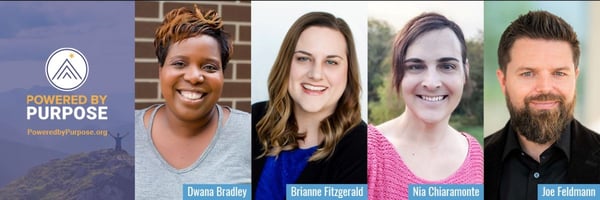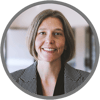In the February 2022 Powered by Purpose Speaker Series, we invited four local professionals to share their experiences in developing leadership and volunteer skills, and how what they’ve learned has transformed their involvement in the community and their purpose today. Here is a recap of the discussion and key takeaways.
The panel included:
- Nia Chiaramonte, Director of Human Resources at Heartland Area Education Agency; One Iowa LGBTQ Leadership Institute graduate
- Joe Feldmann, Associate Principal at OPN Architects; Greater Des Moines Leadership Institute 2016 graduate and currently in Leadership Iowa Class of 2022
- Brianne Fitzgerald, Director of Community Engagement & Inclusion, Alzheimer’s Association Iowa Chapter; Community Connect 2014 participant, Greater Des Moines Leadership Institute 2016 graduate
- Dwana Bradley, Owner of Iowa Urban Media; Greater Des Moines Leadership Institute 2018 graduate
What motivated you to get involved in a leadership program, and why did you choose the one you attended?
Nia was motivated after coming out as a transgender woman in 2018. After spending two years in what she described as “self-protection mode,” she wanted to get involved in a safe space. She chose the One Iowa Leadership Institute, which helped her to recreate herself in her late 30s.
When Joe was nominated for and joined the Greater Des Moines Leadership Institute, he didn’t know much about it or what purpose it would serve for him. Although he knew he had a lot of energy and passion, he wasn’t sure where to point it. He wound up enjoying the Leadership Institute experience so much that he spent five more years involved with the program. He then joined Leadership Iowa with more purpose. He had come to realize the impact and value he could offer and wanted to explore more about how he could apply it by learning more about what was happening around the entire state.
Brianne grew up, went to college and started her career in the Des Moines area. After moving to eastern Iowa for a few years for her husband’s job, her family returned to central Iowa, and she wanted to get re-connected. She first joined Community Connect, which is designed to connect people with mentors in the community. Then she joined the Greater Des Moines Leadership Institute to discover what personally challenged her and how she could use that beyond the program to make an impact.
Dwana has always known herself as a leader. She said she’s the person who spoke up and was “hard headed.” After finding it difficult to advance as a leader with a former employer, she joined the Greater Des Moines Leadership Institute to connect with other people. After graduating from the program, and now as a leader professionally, she is passionate about preparing young leaders. “In the next 10-15 years, I’ll be on a beach somewhere kicking my feet up, so I have an obligation to prepare younger people to be the next leaders.”
Talk a little bit about the take-aways from the leadership experience.
For Joe, the experience in Leadership Iowa has been very different than with the Greater Des Moines Leadership Institute. He’s found learning about all the different sectors—manufacturing, agriculture, government, and economic development—on a statewide level is intriguing. It provides him with a great overview of different perspectives and then challenges him to consider how he can bring his own value. “The program helps you figure out what you do well, and then allows you to align with something else that’s going on in the community.” He admits it’s a lot more intensive, requiring a significant commitment and travel.
Through her involvement, Brianne has a lot of familiarity with the Greater Des Moines Leadership Institute. There are three main programs—one targeted to youth, and the other two for adults. The Youth Leadership Initiative works with sophomore through senior high school students with the intention of building leadership skills. Community Connect, for adults, is a five-month program valuable for people who are looking for a change by connecting them with community mentors. The Leadership Institute is a nine-month commitment based off the Capital Crossroads curriculum, learning about five different capitals, providing the opportunity to take deep dives into work that’s happening within the community, and finding ways to give impact back. Her biggest personal take-way from the programs has been the people she’s met and the relationships she’s built with her class, presenters and alumni. “I didn’t see everything that was right in front of me. I overlooked things or didn’t connect the dots. It’s allowed me to understand broader community needs and open the door for more inclusiveness.”
Dwana is very involved with the Latina Leadership Initiative, which focuses on building young Latina women as leaders. It attracts participants ages 20 years and older who come from across the state. They are paired with mentors who help guide them and features experts every week who present on a range of topics from financial health and wealth to the gaps that exist for women leaders of color. Dwana’s own take-away from her participation in leadership programs has been the opportunity to network, and getting to know people and what they do. Since she works on her own a lot, she had to learn how to work alongside five other people in her group. She learned to see the perspectives of others and to really connect. “You become a family. It gives you an opportunity to continue to be involved.”
Nia points out that One Iowa Leadership Institute is specific to the LGBTQ community and runs from June to October. The program is designed to co-exist with a work schedule and involves a couple hours every other week with 16 or 17 other people. As a person who lived for 35 years in central Iowa “inside themselves,” Nia said networking used to be a struggle for her. Many people believe, or have been told, they can’t be a leader, but the program helped her to see that wasn’t true. She learned to reframe traditional models of volunteering and systems. “How can you look at systems differently so that they work for everybody?”
Nia admits that learning to believe she could be an authentic leader was big for her. “As an LGBTQ person, or even as not, it can be hard to make that connection. When I came out, I had a lot of people say ‘you are not fit to lead.’ But then I had a lot of people who said YOU ARE. Lean on the people who are supportive and follow their advice.”
As you encounter people who aren’t sure if a leadership program is right for them, what’s the advice you’d give them to help them decide whether to take that step?
Brianne believes you’re never too old to participate in a leadership program. She does advise people to have some professional and life experiences, but you don’t need to wait 10-15 years into your career to join. She suggests considering what a program will offer and to do a gut-check on your commitment level and ability to give it as much as you can. She also suggests meeting with people who have been through a program, do your own research, ask questions and even consider who else needs to be involved in your decision—an employer, partner and/or family. If everything aligns, apply! “I look at it this way: There are three “C’s” of life. You’ve got choices, you’ve got chances and changes. Think about your choices, take a chance to see the change. Don’t ask yourself what the world needs, ask yourself what makes you come alive and then go do that.”
Whatever you choose, Joe said you have to give 100%. If you don’t commit yourself to your chosen program, you’re talking a spot someone else might have used to make a difference. Be mentally prepared, and be a good listener. And you don’t have to think of yourself as a leader going in. “I didn’t know what I was going to get out of it, but I personally jumped in 100%. I benefited from perseverance in the program. You will only get out what you put in.”
What advice might you have for people who could influence others on their ability to find out what strengths they have as a leader? How do we support more diversity in leadership?
If Dwana’s former employer had listened to her when she said she’s a true leader, her situation might have turned out differently. So, she suggests giving people the opportunity to share about their own strengths. Maybe you can’t accommodate them immediately, but you can work together on how to help them do what they believe they are capable of doing. She said it’s only because of her own confidence that she kept living as a leader, if she didn’t have that confidence, it could have crushed her. “It can be ok that someone might do it a little different than us. Embrace the differences we all have.”
Nia believes we can all help people to understand their own story. They have to know who they are and what their passions are, so if they don’t, how do you help them get that point? “We tell ourselves stories all the time that aren’t accurate, so help people to learn their story.”
Brianne suggests being open and inviting and talk about system change. “We first have to look inward and ask if we’re doing everything we can.”
To hear more from the panel, watch the Powered by Purpose “Showing Up with Purpose” video.

/PbP%20Web%20Page%20Header%20-%20Mountain%20Man.png?width=1080&name=PbP%20Web%20Page%20Header%20-%20Mountain%20Man.png)



.png?width=150&name=NAVIGATE%20Logo%20(white).png)


